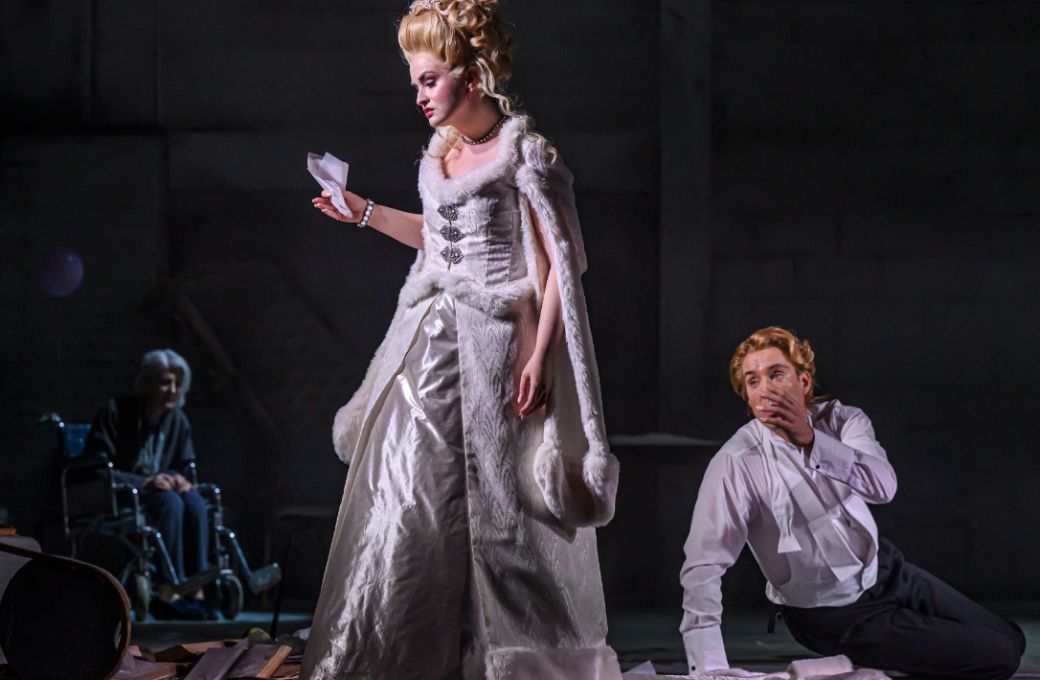In its latest production, Northern Ireland Opera delivers a captivating rendition of Tchaikovsky's masterpiece Eugene Onegin, offering a potent fusion of emotional resonance and visual allure.The production, directed by Cameron Menzies, revisits Tchaikovsky’s operatic portrayal of Pushkin's verse novel from a fresh perspective.

Menzies frames the opera through the eyes of an elderly Tatyana reflecting on her past. This twist shifts the focus from the eponymous hero to Tatyana herself, adding a poignant layer to the narrative. The opera unfolds from her vantage point in her wheelchair in a nursing home, infusing the narrative with themes of memory and regret. The production blends timelines, setting the opera’s central action in the 1900s – evident from the period costumes – while the modern-day nursing home introduces a contemporary touch. This temporal fusion occasionally disrupts the narrative coherence, particularly when modern-day nurses join the aristocrats at the St Petersburg ball.
Set designer and video director Niall McKeever adopts an impressionistic approach, mirroring the fluidity of memory. The stage is simply adorned, featuring a mix of country house chairs and rustic elements; a large barn door and bales of hay evoke the disordered nature of memory of the elderly Tatyana. The sets remain consistent throughout the opera, with modifications for specific scenes, such as a large table for the duel and a more opulent setting for the St Petersburg ball.
There is a discreet use of video montage at the start where a horse is at pasture to convey the pastoral elements of Tatyana’s childhood while the snowflakes during the duel is indicative of the bitterness not only of the Russian winter but Onegin's cold heart. Costume designer Gillian Lennox contributes a whimsical touch, dressing Onegin in a lilac riding coat that enhances his caddish persona, while the ladies don elegant white gowns. Peasant costumes, adorned with straw masks, add a quirky touch to the opening scenes.
Ukrainian baritone Yuriy Yurchuk looks and acts the part as Onegin. Dashing and handsome, he exudes charm and confidence making Tatyana’s falling madly in love with him entirely credible. Although his vocal performance lacked consistency early on, he grew into the role, giving a compellingly passionate depiction of unrequited love by the final act.
Soprano Mary McCabe's depiction of Tatyana also had its highs and lows. Her final rejection of the man she ultimately loved was thrilling and her pianissimo entries were nothing short of magical in the second scene of Act 1. However her portrayal of the naïve, young woman of the first act lacked enthusiasm and spark compounded by an over-wide vibrato and insufficient projection in climactic moments.
There was definite chemistry between Norman Reinhardt’s Lensky and Sarah Richmond’s Olga as they flirted their way through the First Act, the sweet heft of the former’s voice matching the charming gaiety of the latter’s. Lensky’s reflections on life before the duel were especially poignant, delivered with ardent honesty.
There was excellent support from the other singers: mezzo-soprano Carolyn Dobbin brought vocal warmth to Madame Larina as she fussed over her daughters at the start in a Mrs Bennet-esque way. Jenny Bourke as Filippyevna captured the good humour and wit of the nanny well, while Aaron O’Hare garnished many laughs with the hilarious antics of his Monsieur Triquet. The Northern Ireland Opera chorus delivered spirited performances, capturing both the rustic cheer of peasants and the grandeur of Russian society.
Conductor Dominic Limburg maintained dramatic tension throughout, eliciting a taut sound from the orchestra for the duel and lush romanticism for the declarations of love. Despite some issues with intonation in the strings and horns, and a desire for a richer texture in the string section, the performance offered a richly engaging interpretation of Tchaikovsky’s masterpiece.
Northern Ireland Opera partially funded Andrew Larkin's trip to Belfast.


